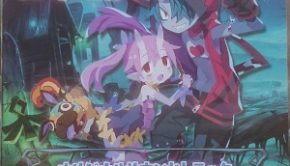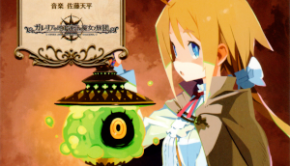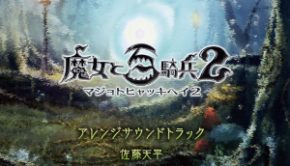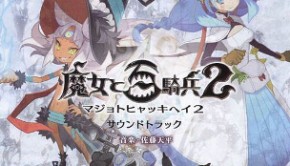Tenpei Sato Profile
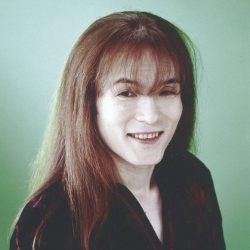 |
Also Known As: 佐藤天平 (さとうてんぺい) / Strawberry Boy / Tenpei Satoh |
| Date of Birth: April 19XX (Tokyo) |
|
| Residence: Tokyo |
|
| Game Works: Disgaea, Marl Kingdom, XZR, Alshark |
|
| Official Site: Japanese Site |
History
| Organisation | Type | Tenure | Role |
| Geinou Yamashirogumi | Music Production | 1987 – 1988 | Composer |
| Telenet Japan | Game Developer | 1988 – 1989 | Composer |
| Freelance | N/A | 1989 – | Composer |
| Miss Kiss | Music Group | 2010 – | Founder, Composer, Arranger, Vocalist |
Biography
Tenpei Sato is a prolific musician famous for his game works on behalf of Nippon Ichi Software and Telenet Japan. Born on April 19XX in Tokyo, Sato was given piano lessons from the age of six and soon developed a love for classical music. As he grew older, his tastes diversified to include various contemporary artists that had become popular in Japan, especially Queen, Yellow Magic Orchestra, and Kate Bush. At he entered middle school, he learned how to play the guitar and used the instrument to create his first composition, a love song. Inspired by the massive surge in popularity of rock bands in the country, Sato went on to establish his own band with a group of ends; enjoying modest success, they performed on the streets of Harajuku and later several Tokyo clubs. He simultaneously played the clarinet in a wind band and received formal musical training. Sato’s creativity further shone in the realm of theatre. Wanting to do more than just act, he established his own theatre group, which produced a number of musicals and plays. Sato composed all of the original music for such productions and learned much about the connection between music and visuals.
Despite this colourful background, Sato decided to become a teacher, rather than pursue a career in the arts. Trained at Waseda University, Sato states that he did not have an interesting life there, aside from singing at ceremonies. Following a near death experience after graduating, he decided to pursue a life in music instead. He joined the esteemed music group Geinou Yamashirogumi, just as they producing the acclaimed score for Akira. Here, he studied ethnic music from all over the world and grew to appreciate a wide range of cultures. The artist was particularly influenced by Balinese Gamalan and Kecak, as well as the the traditional choral musics of Bulgaria, Asia, and Africa. Learning to fuse traditional elements with contemporary ones, he performed the kabuki rock musical Torigami through the company and also worked on album creation. A further focus of his work was programming synthesizers, which he learned to use in conjunction with instrumental and vocal recordings. As he concluded this training, Sato came to realize that he had gained exposure and enjoyment to all types of music. He continues to make use of the experiences he gained through Geinou Yamashirogumi, his musical group, and his rock band even today.
During his time at Geinou Yamashirogumi, Sato was introduced to game music and decided it was a promising field to compose for. In 1988, he was contracted to work for Tokyo-based game developer Telenet Japan to assist long-term composer Shinobu Ogawa. He combined composing and programming roles on XZR and XZR II (aka Exile. Throughout these projects, Sato embraced the creative and technicals challenge of writing music for a limited number of audio streams, by hybridising PSG and FM synth to create rich timbres and distinctive swells. He went on to score the music for the top-charting action adventure Valis II. Focusing particularly on the music used during the animated cutscenes, he offered a thrilling accompaniment to the opening scene and supported the reflective ending scene where the heroine lingers behind. Such tracks were very well-received and, as a result, the game was celebrated with a soundtrack release. The artist went on to produce much of the music for Cyber City, a launch title for the FM-Towns. As the computer used CD-ROMs, Sato was able to use synthesizers and sampling instead of the internal sound source, resulting in a more genuine sound.
At the end of 1989, Sato elected to become an independent musician, but continued to write game-related music. Given he made a big impression with his Telenet works, he was invited to compose music for the RPG Emerald Dragon alongside Nobuhito Koise. Having been impressed with the high ideals and technological skill of the young developers, Sato passionately composed a range of music for the title with its worldview firmly in mind. His four catchy and elaborate compositions were particularly enjoyed during the battle and town screens of the highly successful title. He returned to score a portion of the Vain Dream alongside the same team. Following such works, Sato achieved a breakthrough by single-handedly scoring Alshark on behalf of Right Stuff. Throughout the production, he blended influences from traditional RPG soundtracks with shining rock pieces; the opening theme, for instance, gave the sense of gliding through space. His score for the Genesis’ Task Force Harrier EX also proved technologically commanded and musically rich; focusing on rhythm and timbre more than melody, the soundtrack created a suitable atmosphere for the shooter with its piercing funk basses and uplifting synth leads.
Having risen in prominence through his work on Alshark, Sato was asked to score a range of titles on behalf of several small developers in Japan in the early 1990s. As the main composer affiliated with Birdie Software, he went on to create upbeat sentimental scores for the Cal, Beast, and Red titles for early PCs. He matched the light-hearted tone of these early bishoujo titles with a range of soft jazz, pop, and rock music. While these titles received little exposure and were never localised, they still appealed to a niche audience in Japan. As a result, Sato proudly made them the subject of album releases, with support from his record label Polydor. Under the pseudonym Strawberry Boy, he also composed both Mirage titles on behalf of Discovery and made them subject to album releases. Following his work on Task Force Harrier EX, he was also asked to co-compose a number of Super Nintendo titles by Jorudan. Writing everything from fast-paced shooting anthems of Imperium, to the moody ambient backdrop of Aliens vs. Predator, to the traditional fantasy orchestrations of Magna Braban and Shinseiki Odysselya, his stylistic versatility and technical mastery truly shone on such productions.
By 1993, Sato started exploring the possibilities of CD-based game audio. He was asked to return to the Sega CD version of Alshark and created an expanded, remixed score that was performed by rock band. In a time when tie-ins with the music industry were rare, he also produced and recorded a vocal theme for the game, sung by girl trio Puff. To achieve the best results, Sato personally supervised the score’s rehearsal and recording sessions, and ended up redoing the vocal parts several times. Following this success, the artist was invited to produce the debut single for idol Reiko Chiba, featuring cover and image songs dedicated to SNK’s Fatal Fury Special. In other works, Sato revived his affiliation with Glodia to score their final titles, Alvaleak Continent, Etemiburu: Tenjoumukyuu, and Bible Master II: The Chaos of Aglia. Technological advances enabled him to offer more exuberant scores to these titles and the album release for the latter (where he amusingly posed as Jesus for the back cover) proved a particular success. Between such glamorous projects, he also worked on a handful of the Super Nintendo pachinko simulators for Jorudan, including all background music and jingles featured in the Hisshou 777 Fighter trilogy.
In 1995, Sato created his first solo album, Imagination. All 12 exquisite tracks on this album were inspired by the busy Tokyo district where Sato was living and working at the time, Shinjuku; he felt flashes of inspiration from the diverse people, tall skyscrapers, and rich cultures of this location and often incorporated them into the music. Free from the usual limitations of game writing, Sato relished the opportunity to explore and expand his musicality on this release, even writing a rap track. Following this work, the artist explored other non-game works by scoring the films Itsuka no Main, Umare Kawareru Mono Naraba, and D1. The artist found writing the soundtrack to the latter to be particularly creatively fulfilling and was delighted it was recognised at European film festivals. The music expressed the instability of the protagonist’s mental state with fantasy-themed music written in an avant-garde style. In other surprising roles, Sato was also responsible for the music of AIBO, the robotic dog created by Sony. He also raised the profile of game music by hosting a composer discussion panel and wrote a guide to aspiring composers called Computer Music: A Super Beginner’s Manual.
Between such productions, Sato embraced the PlayStation as a vector for lavish experimentation. The artist knew exactly how to approach 1995’s Eko Eko Azaraku: Wizard of Darkness, given he had specialised in horror writing at Geinou Yamashirogumi. Throughout the production, he blended detuned instruments, ambient sound effects, and eerie voice samples to haunting effect. Keen to diversify further, he channeled hard rock on the boxing title Hard Blow and lounge jazz on the bar simulation Cocktail Harmony, also serving as voice actor for the bartender. However, he gained most attention as the composer of Nippon Ichi Software’s Marl Kingdom: The Adventure of the Puppet Princess, the first video game to feature a musical. His past experience writing musicals, combined with his love for the game’s scenario and characters, meant he was overflowing with ideas for songs. After upgrading the equipment at his studio in Shibuya, he recorded the score with a team of professional vocalists. The artist re-recorded the songs for the overseas version, Rhapsody: A Musical Adventure, with American singers. The songs were beloved by players, especially the ending theme “Thank You”, and the soundtrack release was a best-seller.
Following the success of Rhapsody: A Musical Adventure, Tenpei Sato was asked back to score numerous subsequent scores by Nippon Ichi Software. He raised the quality and quantity of music for 1999’s Little Princess: Puppet Princess of Marl Kingdom 2 to match the standards of most professional musicals, before lavishly producing the vocal themes and background music for the PlayStation 2’s Angel’s Present: Chronicles of Marl Kingdom. On both projects, he also participated as a vocalist on a number of tracks. Between such roles, Sato reflected the action-packed battlefields of Barnhouse Effect’s Combat Choro Q and Choro Q HG with weighty classical music. His bold orchestral sound was also sought on Magnetic Power Microman: Generation 2000 and Brigandine: Grand Edition. He also had minor roles in games such as Marl Jong!!, Marl de Jigsaw, Real Pool, and Play It Pinball. Also in 2000, Sato penned Schell Bullet: Thanaphs68, an experimental image album inspired by Kunihiko Ikuhara’s novel; aiming to create a “cyber-progressive-space fantasy”, he blended organic and futuristic soundscapes with apocalyptic poetry readings and dramatic vocal performances throughout the release.
From 2002, Sato focused on scoring PlayStation 2 tactical RPGs for Nippon Ichi Software. With La Pucelle: Tactics, he created a rich emotional fantasy score that enhanced both the gameplay and cinematics. As with most of his productions for the company, the soundtrack was bundled with the game and an arranged album was commercially released featuring upgraded and lengthened versions of musical highlights. The subsequent year, he filled the cult hit Disgaea: Hour of Darkness with musical highlights. Contrasting the game’s demonic setting with its light-hearted characters, the soundtrack fused haunting orchestral music, contemporary action themes, and memorable vocal themes. He developed his relationship with producer and lyricist Sohei Niikawa while fulfilling numerous requests during the project’s production. In 2003, the artist also produced a vocal concert to celebrate the tenth anniversary of Nippon Ichi, performing favourites from the Marl’s Kingdom series alongside vocalists such as Maria Kawamura and Ikue Otani. He nevertheless remained active in other projects, including the anime-to-game adaptation Gunslinger Girl, The Conveni 3, Mistlarouge, and Baskelian.
With titles such as Disgaea: Hour of Darkness emerging as major hits, Sato went on to produce emotionally driven scores for several more Nippon Ichi titles. He reflected the sad story and young characters of 2004’s Phantom Brave with healing music and sentimental theme songs, before capturing the dark and sorrowful atmosphere of Soul Nomad and the Soul Eaters using heavy worldly orchestrations. At request of the new sound director, Disgaea 2: Cursed Memories took a more action-packed, rock-focused approach than its predecessor. By contrast, the school setting of Disgaea 3: Absence of Justice and its downloadable content inspired Sato to produce numerous childish and parodical pieces, especially in the vocal themes. The artist also crossed over to the series’ animation adaptation, mixing orchestral arrangements of fan favourites with new compositions. In other non-game roles, Sato explored delicate sounds on the romance movie Flowers, recording with just piano, strings, and acoustic guitar. He additionally served as a producer for a duo of Tsugaru-jamisen performers, created the theme song for marathon runner Masako Chiba, and composed the Air Base Tsuiki DVD.
In recent years, Sato has worked on a string of ports and remakes of Nippon Ichi favourites. He has been involved in the ports and remakes of Nippon Ichi favourites for PSP (Disgaea, Disgaea 2, La Pucelle), DS (Rhapsody: A Musical Adventure), Wii (Phantom Brave), and Vita (Disgaea 3). In many of these titles, Sato enhanced the samples of the original compositions and also penned new theme songs. The artist has nevertheless been involved in new projects too. For the two spinoffs dedicated to Disgaea’s Prinny characters, Sato reflected the shift to platforming gameplay with light-hearted, fast-paced music. By contrast, he took a more serious, classically-oriented approach for the visual novel adaptation Disgaea Infinite. He was also delighted to write the music for Princess Antiphona’s Hymn: Angel’s Score Op. A, a spiritual successor to the Marl’s Kingdom series. The soundtrack featured more than 30 pieces of background music and 15 musical-style songs, this time adopting a modern pop style. Sato’s works on behalf of Nippon Ichi have continued to feature in numerous commercial and bundled album releases, including three best compilations, and have featured in Joysound’s karaoke catalogue.
Between his ongoing Nippon Ichi projects, Tenpei Sato continues to embark on more surprising roles. His music has recently been featured in projects as diverse as new attractions at the Namco Namja Town theme park, an advertisement for a Japanese milk firm, and a DS guide for passing tan English language test. The artist also served as the songwriter for a recently premiered musical, starring visual kei band Lucifer, and produced the debut single “I Still Love You” of pop singer Saori Terai. Revisiting his youth, the artist has also revived his rock band Miss Kiss, serving as its vocalist; they have performed live at several concerts in Japan, combining original material with covers of Disgaea favourites. Back in the realm of game music, the artist gave his all on Disgaea 4: A Promise Unforgotten, combining the series’ signature sound with mature approaches to the vocal and action themes. He also recently penned a Castlevania remix for a multi-artist tribute album and co-composed half of Compile Heart’s Mugen Souls alongside Kenji Kaneko. Continuing his colouful and prolific career, Sato has recently completed work on Mugen Souls Z, Disgaea Dimension 2, and The Witch and The Hundred Knight.
References:
– Various Game & Album Credits
– Liner Notes Translations
– VGMdb Discography
– Official Site (Japanese)
– Interview with RocketBaby (English, October 2000, Archived)
– Interview with Tokidoki Journal (English, September 2006, Archived)
– Interview with Game Music Online (English, August 2010)
© Biography by Chris Greening (September 2007). Last updated on March 13, 2013. Do not republish without formal permission.
Posted on March 13, 2013 by Chris Greening. Last modified on March 21, 2014.

